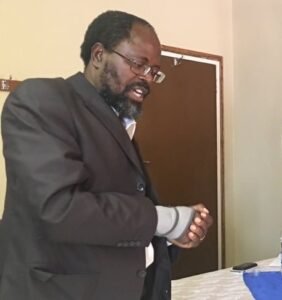By Beverly Bizeki
MASVINGO – The conviction and subsequent sentencing of Advocate Fadzayi Mahere the Citizens Coalition for Change (CCC) party national spokesperson on April 05, 2023 for communicating falsehoods was received with mixed feelings, with magistrate Taurai Manuwere ending up being the biggest victim as he received serious backlash largely from human rights defenders and opposition supporters.
Mahere was sentenced for publishing or communicating a false statement with the intention of inciting or promoting public disorder or public violence or endangering public safety as defined in Section 31(a)(i) of the Criminal Law (Codification and Reform) Act. This was after she falsely published on her twitter handle alleging that a police officer had hit and killed a newly born baby who was strapped on the back of her mother.
Interestingly, the human rights defenders and opposition supporters condoned Mahere’s conduct and rather blamed the judiciary for being captured by the ruling party Zanu PF yet the truth was the constitutional lawyer had indeed had spread fake news that undermined the public confidence in a law enforcement agency, the Zimbabwe Republic Police (ZRP).
However, polarisation made human rights defenders and opposition supporters ignore the glaring impact of disinformation that Mahere disseminated on social media, notwithstanding the fact that the judiciary system in Zimbabwe might be captured as well.
Though Mahere herself pleaded guilty to communicating falsehoods, her supporters dismissed the charges and sentencing as frivolous claiming that there is no such law in Zimbabwe that criminalises publishing or communicating a false statement with intention of inciting public disorder yet Section 31(a)(i) of the Criminal Law (Codification and Reform) Act exactly speaks to that.
Similarly, Zanu PF has established a fully-fledged online propaganda team named Varakashi which equally spreads falsehoods with impunity. As expected, Varakashi receive standing ovation and ululations from Zanu PF senior officials and supporters respectively, for deliberating misinforming the electorate ahead of 2023 general elections.
The deliberate spreading of disinformation has since increased in Zimbabwe as the nation prepares for the general elections set for August 23, 2023. Researches have shown that disinformation is negatively impacting the youths who are the most active age group online.
Fact checking experts in Zimbabwe revealed to TellZim News that youths and young women are the biggest victims of disinformation and misinformation in Zimbabwe and the situation is getting too bad ahead of 2023 general elections.

ZimFact executive director Chris Chinaka said there has since been a national rise of disinformation and misinformation since the proclamation of elections date by President Emmerson Mnangagwa and the youths, mostly active online, are vulnerable as they cannot distinguish between facts and opinions.
“Statistics show that the youths are the majority consumers of online news and are the most victims of disinformation. The situation has since reached another level as we have witnessed a national rise of disinformation in Zimbabwe since the proclamation of election date. Many people are sharing information without verifying because they want to be the first to break the news yet they will be spreading false information,” said Chinaka.
“Disinformation is rife in WhatsApp group chats of political parties where false information about political opponents is deliberately published and circulated in order to win votes. At the end of it all, the youths are the biggest victims and purveyors of disinformation, hence, I want to encourage all media organisations and journalists to carry out campaigns to combat disinformation ahead of the general elections,” Chinaka added.
Dr Last Alfandika in a research, commissioned by TellZim, on the impact disinformation in Zimbabwe, found out that disinformation is on the rise especially this election period when almost everyone is focused on the plebiscite.

In an interview with TellZim, Dr Alfandika said the ever increasing WhatsApp group chats have become the major sources of disinformation, and that it is sad that people are using this fake information to make decisions.
“The on-going social media disinformation and misinformation has continued to undermine peace and the people’s rights of access to credible information with the majority of the people unable to make informed decisions due to lack of credible information especially as we draw near the 2023 harmonised elections. While traditional media is committed to stemming the disinformation crisis, few people have access to it thus relying on social media for information,” said Dr Alfandika.
Youths who spoke to TellZim News confided that they often forwarded messages especially on WhatsApp platform without verifying first to establish if the information is true or false. This, according to youths interviewed in Mutare, is because they lack the skills to fact check if the information is true of false.
“Disinformation is now rampant and we are afraid many youths are going to make their political choices from a misinformed position come August 23, 2023. We are both victims and purveyors of disinformation and this is largely because we do not have the skills to check if the information is true. We will also be competing to be the first to break the news,” they said.
Researches by the Media Institute of Southern Africa (MISA Zimbabwe) indicate that the spread of disinformation has also negatively impacted the integrity of the journalism profession thus impacting the credibility of the media industry broadly. Misa said, in its 2012 communique, that government should take an active role in combating disinformation by promoting access to credible information.
“Citizens should be equipped with knowledge of fact checking tools and how to use them to verify information before sharing it. Governments need to be more proactive in promoting access to information so as to counter the spread of false information which is usually caused by a dearth of information from the state. Government laws on disinformation should be couched in line with international standards and best practices to ensure that they do not result in self-censorship and infringement of the right to freedom of expression,” said MISA Zimbabwe.
Chinaka urged citizens especially the youths to play an active role in combating disinformation saying they should make it a point that they establish if the information is credible before they share on social media platforms.
“Don’t believe everything that you read and see on social media platforms. I want to encourage the youths and electorate to go to established media organisations’ platforms for verification because journalists have discipline and the skills to fact check information before they post.
“It is everyone’s obligation to spread only fact-checked information therefore, no one should spread information before establishing the truth,” said Chinaka.
Despite being a developing country, Zimbabwe has followed the global trend of embracing social media as key communication platforms. There has been an upswing in the use of social media in Zimbabwe since the outbreak of Covid-19 pandemic in 2020. Social media platforms such as WhatsApp, Facebook and Twitter have dominated as the most preferred platforms.
Misa Zimbabwe in 2018 notes that WhatsApp is predominantly used and in 2017, 47% of the total data bundles purchased were for WhatsApp therefore, people should play an active role to combat disinformation on this platform and other social media platforms ahead of 2023 general elections.
